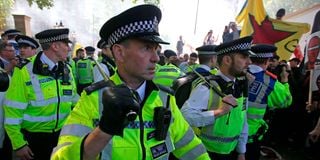London scandals highlight poor work by police nationwide

British Metropolitan Police officers brandish their batons as they clash with demonstrators protesting against Turkey's President Recep Tayyip Erdogan outside the entrance to Downing Street in central London on May 15, 2018. Today, a major complaint is that the policemen are a remote presence, glimpsed only in passing patrol cars.
What you need to know:
- Today, a major complaint is that British policemen are a remote presence, glimpsed only in passing patrol cars.
- Worse has been a series of scandals within the Metropolitan Police, the force which operates in London, which led to the resignation of the force’s Commissioner, Ms Cressida Dick.
- Corruption, racism, misogyny and homophobia have been discovered within the Met, highlighted by the arrest last week of a former Met officer who posted racial content on WhatsApp.
There was a time when the British police force was exemplified by a popular television series, Dixon of Dock Green.
Introducing the programme with a smart salute and the greeting “Evening all” was the mature and sympathetic Police Constable George Dixon, who would then go about tackling criminals and solving (mostly petty) crimes in the fictitious London area of Dock Green.
Everybody loved PC Dixon, the typical “British bobby”, but that was when policemen often lived in the neighbourhoods they policed and were seen regularly to acknowledge or chat with on the streets.
Today, a major complaint is that policemen are a remote presence, glimpsed only in passing patrol cars.
Residential burglaries
A report last week by the think tank, Police Exchange, charged that policing in the UK had “lost its way” and that the ability to solve common crime was “woefully low,” with only 3.5 per cent of residential burglaries, 6.3 per cent of robberies and 4.1 per cent of thefts solved during the last year.
Worse has been a series of scandals within the Metropolitan Police, the force which operates in London, which led to the resignation of the force’s Commissioner, Ms Cressida Dick.
Corruption, racism, misogyny and homophobia have been discovered within the Met, highlighted by the arrest last week of a former Met officer who posted racial content on WhatsApp.
A BBC investigation found that Rob Lewis, now a Home Office official, sent racist messages about the flooding in Pakistan, which left almost 1,700 people dead. Describing the posts as “vile and deplorable”, the Home Office suspended Lewis and police charged him with offences under the Communications Act.
The BBC’s Newsnight programme discovered that Lewis had created a group chat, which included other former Met police officers. Dozens of vile messages were posted by the group, including many that were too offensive to show on television.
Some of them commented on the government’s policy to send migrants to Rwanda. Others targeted Prince Harry and his American wife, alongside racist language.
The BBC reported that serving police officers were members of the WhatsApp group, but many left after the murder of Sarah Everard last year by Wayne Couzens, then a serving police officer.
A new Commissioner of the Metropolitan Police, Sir Mark Rowley, was appointed in September and vowed to build back public trust in the force. He promised that police would visit every home in London that was burgled, instead of the current 50 per cent.
This pledge was subsequently adopted by all police forces across England and Wales. Martin Hewitt, chairman of the National Police Chiefs’ Council, said the move “should see more burglaries solved and more offenders prosecuted”.
What ordinary Brits would like to see would be a few more PC Dixons.
* * *
It may sound a bit gruesome, but it is a practice that raises thousands of pounds for charity.
With the permission of bereaved families, workers at some crematoria collect metal left over from incinerations, including coffin handles and name plates, plus any metal parts, such as implants, from bodies.
Two crematoria operated by Durham County Council have each raised £12,000 with funds going to children with cancer and to research projects.
Bereavement manager Graham Harrison said, “We are incredibly grateful to the generous families who have donated recycled metals to charity, despite going through a very difficult time themselves.”
* * *
Weekend drinking for many young people these days involves consuming relatively cheap supermarket beer at home, then going out late to more expensive clubs and bars. This often leads to rowdiness in city centres.
Describing pre-drinking on nights out as “a potentially dangerous culture”, the Durham police force has responded by providing breathalysers for clubs as a guide to who they should admit.
The breathalysers, which have a lights system, show if potentially unsafe levels of intoxication are reached.
Inspector Dave Clarke, said, “Sadly, time and again we see the negative effects alcohol has on people, whether through violence, anti-social behaviour or not being aware of their surroundings.”
Not everyone will be breathalysed. Door staff will judge who might benefit from not drinking anymore that night.
Said Inspector Clarke, “We want everyone to have a great night but we also want to make sure they make it home safely and without disrupting other residents.”
* * *
Jokey lines to sell shopkeepers’ goods and services:
Sign on a shoe repair shop: “We will heel you, we will save your sole, we will even dye for you.”
A chiropodist: “Time wounds all heels.”
An optician: “If you cannot see what you’re looking for, you’ve come to the right place.”
A car dealership: “The best way to get back on your feet is to miss a payment.”
And best of all, on a garbage truck: “Caution! This truck is full of political promises.”





